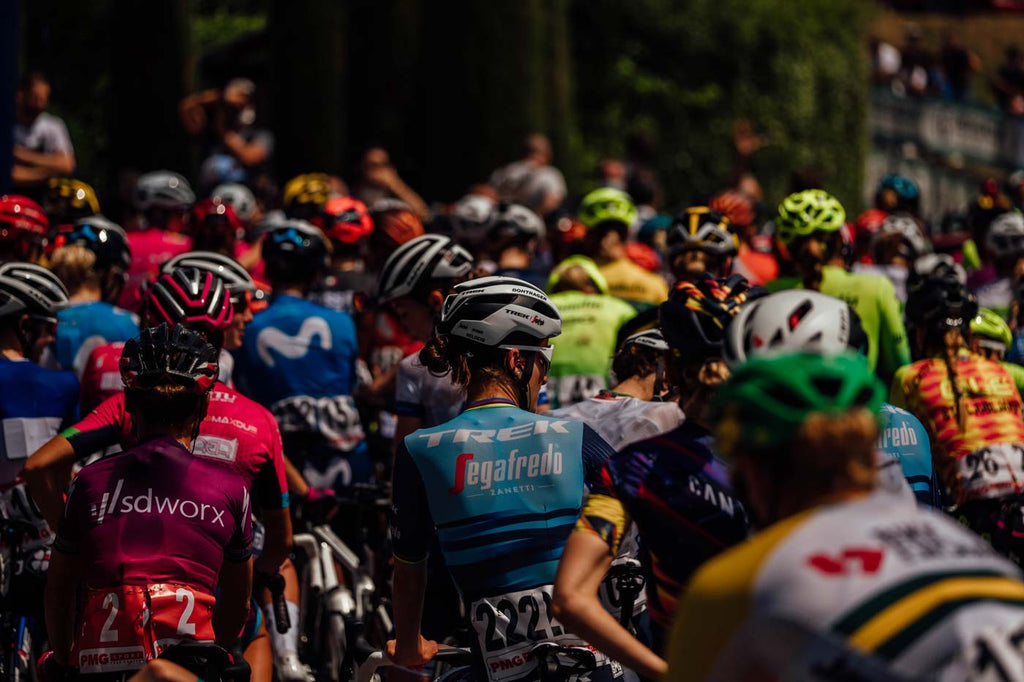Since 2018, women’s cycling union, The Cyclists’ Alliance (TCA), have surveyed riders on their working conditions. Although not all riders in the women’s peloton respond to the survey, the Alliance are able to gather data on a representative cross section of women racing for UCI-registered teams.
With 27% of the respondents racing for WWT teams and 73% Continental riders, the demographic of TCA’s respondents is roughly representative of the makeup of riders on registered UCI teams — wherein the majority are Continental. However, TCA were keen to point out that a direct year-on-year comparison is not possible due to the fact that the same riders do not respond each time.
Related: Women's WorldTeam Salaries: a delicate balance
This year, for the first time, the survey has been split into three separate categories; Working Conditions, Legal and Ethics, and Team Culture and the results of the first section, on working conditions, was released this week. The first part of the survey included details on: salaries, contractual inclusions, rider reimbursements, second jobs and studying, and the impact of Covid-19.
Of the 97 riders who responded, 86% said that they thought salaries were too low, and with the number of riders who selected their income as ‘no salary’ having increased from 17% in 2018 to 34% in 2021 that comes as no surprise. Of those surveyed who are paid a salary, only 21% receive €30,000-€40,000 or more, of which only two are Continental riders, all other Continental riders who answered the survey earn no salary, or less than €19,999.

Image: The Cyclists' Alliance
As well as many riders receiving no remuneration for their commitment to their teams, the disparity between those at the top and those at the bottom continues to increase in myriad areas.
Related: 5 years on, is the Women's WorldTour working?
While the UCI introduced minimum salary requirements for WWT teams in 2020, no such requirement exists for their Continental counterparts which has widened the gap between the 160 WWT riders and 771 Continental. At present, the nine WWT teams must pay their riders a minimum of €20,000 a year for those who are employed directly, and €32,800 for self-employed riders. There is no minimum salary requirement for Continental riders.
In their report, TCA referenced an audit commissioned by the UCI and carried out by EY Lausanne. The UCI heralded the findings as proof that the working conditions of the women’s peloton are improving. The audit found a 25% increase on average salaries for WWT riders from 2020-2021, however they failed to acknowledge the ever-widening gap between WWT teams and those on the second tier. The UCI also did not reference the fact that teams BikeExchange and Trek-Segafredo have voluntarily increased their women’s team salaries in line with men’s ProTeam minimums, which inflates the figures. 
Related: "We can change the culture of the sport" – Iris Slappendel interview
On the subject of the disparity, TCA commented in their report that: “more must be done to ensure Continental riders who often commit the same amount of time to training and racing as WWT riders and they need to be adequately supported financially for the women’s peloton to continue growing and progressing.”
Not only did TCA find a disparity between the salaries of those at the top and the rest of the peloton, they also found that the support given in contracts differed between WWT and Continental riders. 94% of WWT riders benefit from medical support in their contracts, whereas amongst Continental riders only 33% received the same support. 11% of WWT riders have a pension plan built into their contract, however no Continental riders had this benefit.
Given the lack of financial support many riders face, it is unsurprising that a significant number take up work alongside racing and training. TCA found that 39% of respondents are working a second job alongside racing of which 23.47% work fewer than 20 hours/week and 15.31% work more than 20 hours. 37.76% of riders are completing some form of education alongside their racing careers and 14% were combining both working and studying with cycling. Those working more than 20 hours per week are doing so through financial imperative, with 67% of that group earning no salary from their teams and 14% earning less than €5,000.
Related: The Cyclist's Alliance new three-step mentor programme
The necessity for many women to earn a living or gain an education outside of cycling creates a paradox in which they are unable to fully focus on their sport but in turn gain educational and career experience that stands to benefit them after they retire. TCA found that amongst the riders who work more than 20 hours per week, 67% have a masters degree, postgraduate diploma or doctoral degree, and 20% have graduated from another form of higher education. 
In terms of the impact of Covid-19, the picture was brighter overall compared to 2020, however, consistent with the theme of the rest of the findings, TCA reported that riders on Continental teams are feeling a greater impact from the ongoing pandemic than their WWT colleagues. 20% of Continental riders had to reimburse their teams for the cost of any Covid testing required to travel and race, meanwhile 95% of WWT riders claimed not to have suffered any adverse financial effects from Covid in the 2021 season.
Related: Rouleur Conversations Podcast: Gracie Elvin and the TCA mentoring programme
As well as asking riders about their current conditions, TCA also asked what the top priorities for those surveyed were when it came to future TCA advocacy work. The top two answers were tied on 21% each and were for “all riders to earn a minimum salary” and “increasing the live TV coverage of races" — two subjects that are frequently raised in discussions around how to progress women's cycling.
TCA said they plan to release the findings from the second part of the survey, ‘Legal and Ethics’ after the Tokyo Olympic Games.






























